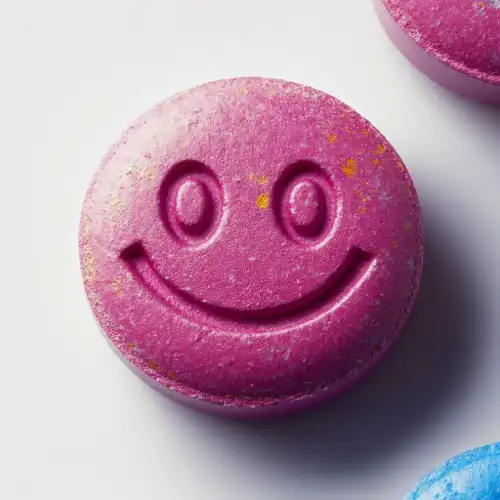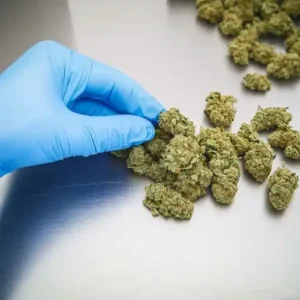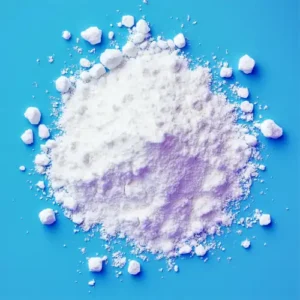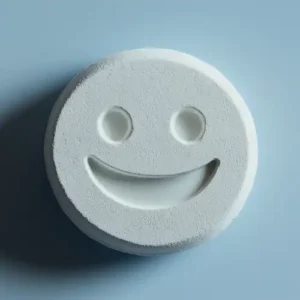Ecstasy is another name for MDMA, which stands for methylenedioxymethamphetamine). It’s a stimulant drug that’s typically used as a party drug. Also known as E, Eckies, Pills, Bikkies, Pingers, Molly, and Flippers, Ecstasy can be purchased in capsules, powder, or crystal form. The drug comes in different sizes and colours, and many come imprinted with a symbol or picture.
MDMA has both hallucinogenic and stimulant properties and is a derivative of the compounds amphetamine and methamphetamine. Just like amphetamines, MDMA can cause stimulation, and when taken in higher doses it can have a hallucinogenic effect.
As an empathogen, Ecstasy typically increases the user’s feelings of compassion and empathy towards other people.
Important Facts About Ecstasy
While we know that Ecstasy contains the drug MDMA, many tablets sold as Ecstasy contain no MDMA at all, some have just a small amount, while others have large amounts of MDMA. Some manufacturers use other drugs and “fillers” such as caffeine, aspirin, ketamine, and chalk in their ecstasy tablets. For this reason, it’s almost impossible to know what effects users can expect after taking Ecstasy, or indeed just how dangerous the side effects might be.
Other Dangers Associated with Ecstasy Use
- Injecting ecstasy can severely damage the body’s organs, resulting in blocked and/or inflamed blood vessels, blood poisoning, and abscesses.
- Snorting ecstasy can produce sores and burns on the membrane lining the interior of the nose;
- If the user injects into tissue or an artery, bacterial infections can also occur. This could cause vein collapse, damage the heart valves, infection at the injection site, bruising, or more serious injuries.
- There are a range of mental health issues that may result from using ecstasy, and these effects will depend on the particular person (their health, mood, size, previous drug experience, gender, personality, expectations, whether other drugs have been taken, and whether the person has consumed food); the drug (its purity, the amount used, whether it is swallowed, smoked, injected, or snorted, and how often it is used); and the place (whether the person is on his or her own, whether they are using with friends, whether they are at work, at home, or before driving)
How Can You Be Sure of What You’re Taking?
The simple answer to this question is: “You can’t”. There is no guarantee ever that the powder, liquid, or pill you’re taking actually contains what it’s supposed to. Further, you simply don’t know how you will react to a particular dose of a particular drug, because everyone is different.
Take Care of Your Brain
No-one would willingly damage their brain, yet we know that ecstasy can adversely affect your brain long after it’s been taken. Studies show that ecstasy can, and does, cause brain problems, with mood, thinking, judgement, and memory being adversely affected.
Take Care of Yourself!
If you still want to try a drug, try a small amount to start with, and don’t consider taking any more until you’ve waited at least an hour to see what effect it has on you. Keep in mind that some drugs found in ecstasy have a delayed effect, which means that if you think it’s not working and you top up too soon, you could overdose.
It’s very important that you stay hydrated if you have taken ecstasy. You need to cool down, so take regular breaks from dancing and other strenuous activities.
If you have taken a drug and you’re beginning to feel unwell, you must start looking after yourself. If you need help, ask for it! If the problem persists, or gets worse, you probably need medical help. Remember, you won’t be reported to the police, so don’t risk your life.
Know Your Source
With underground manufacturing, it’s impossible to know exactly what is contained in any ecstasy pill or powder. Ecstasy obtained through illegal channels could be cut with other unknown and potentially dangerous substances. Some ecstasy tablets contain no MDMA at all. Others may be cut with substances like methamphetamine, aspirin, caffeine or even chalk.
Purchase testing kits online to analyze the contents of any drugs obtained. While not foolproof, testing kits can identify some adulterants. Do not ingest substances if testing reveals any unexpected or dangerous contaminants.
Measure Your Dose
Always start with a very small dose, such as a quarter or half pill. Effects manifest after 30-60 minutes. Resist any urge to take more before that time, as delayed effects could lead to accidental overdose.
MDMA doses over 250 mg substantially increase the risks of adverse effects. Purchase a milligram scale to carefully measure powder doses. When uncertain, err on the side of too little rather than too much.
Avoid Risky Routes
Never inject ecstasy. Injecting causes the drug to rapidly reach the brain, increasing risks of overdose. It also raises the chance of vein damage, infections, and other injection-related harms.
Avoid snorting as well, which can damage nasal membranes. Oral consumption is the safest use method, avoiding risks from snorting and injection.
Stay Hydrated
Failure to adequately hydrate is a leading cause of ecstasy-related medical emergencies. Drink 125-250 ml of water every hour when using. Avoid overhydrating which can also be dangerous. Sports drinks or electrolyte solutions can help replenish salts and nutrients lost through sweating.
Take regular cool-down breaks from activities like dancing. Overheating is a major risk factor for severe side effects. Wear loose, breathable clothing and avoid hot crowded venues when possible.
Don’t Use Alone
Only use ecstasy in the presence of sober friends who can monitor for signs of overdose and seek medical care if needed. Have them measure doses for you to prevent errors in judgement or coordination.
Avoid combining ecstasy with other substances, including alcohol, marijuana, opioids or other stimulants. Mixing drugs significantly increases the risks. Tell friends what you have taken so they can properly respond in an emergency.
Seek Help for Concerning Symptoms
Promptly seek medical attention if you or someone you are with experiences concerning symptoms like:
- High fever
- Seizures
- Extreme confusion or agitation
- Uncontrolled vomiting
- Chest pain
- Trouble breathing
- Loss of consciousness
Be honest about substances used to allow proper emergency treatment. The goal is preserving health and safety, not criminal charges.
Need Help or Advice?
You can talk to FRANK in confidence. Their helpline is open 24 hours a day, 7 days a week on 0300 123 6600 or you can chat online between 2-6pm every day.
Photo by Anthony Cunningham for Zoom Testing
Zoom Testing is a leading UK drug testing company and a supplier of Drug Test Kits.
This post was originally published in 2018. It was last updated in January 2025.





